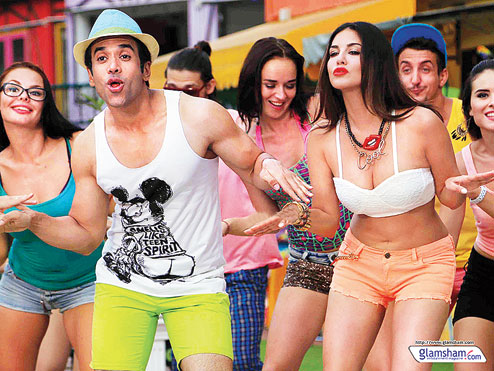 |
| A scene from Manadasundari |
More young people, more new groups wanting to tackle performance differently. Things look good for local theatre if these talents stay committed and do not defect to greener pastures. Two recently-established units delve into early 20th-century literature about “fallen” women to create thought-provoking debuts.
Better known as an actress, Suranjana Dasgupta takes to scripting and directing Arshi’s Manadasundari, based on Shikshita Patitar Atmacharit, the possibly autobiographical, possibly fictitious account that caused a sensation upon publication in 1929. Some critics, refusing to believe in its authenticity, suggested that the author’s name and persona were both concocted. Dasgupta faithfully transposes Manada Devi’s prose onto the stage, from her birth and upbringing in a liberal home and her education in Bethune School, to the ill-fated relationship that led her on a downward spiral the rest of her life, ultimately into the abysmal depths of prostitution.
Dasgupta frames the tale within the rehearsal process of a theatre troupe — an overused technique that does not add extra dimensions to the play except for their search for the story’s relevance to contemporary society. As director of that group, she takes this opportunity to explicitly state her opinion, that society remains just as callous to the wishes of sex workers to escape their plight as it was almost a century ago (Manada Devi reserves unstinted praise only for Shivnath Shastri and Chittaranjan Das). One wonders whether we could not have made this connection for ourselves.
The team of over 20 cast members, equally divided among men and women, performs quite creditably given its relative youth and large numbers. Senjuti Ray Mukhopadhyay captures the adult Manada’s distress and near-breakdown. As the young girl Manada, Kathakali Deb shows promise and sings well.
Similarly, Taraswan stages the first Bengali production of Tatri, the true story of the Nambudiri woman from Trissur who in 1905 charged 64 Brahmin men (including her lover, teacher, husband and brother-in-law) with sexually exploiting her. This drama is doing the rounds across India: Malayalam and Hindi imports have arrived previously. The present director, Abanti Chakraborty, collaborated on the dramatisation with Probir Guha, Farooque Ghoshal and choreographer Joyraj Bhattacharya, going directly to Lalitambika Antarjanam’s short story, Revenge Herself. As in the other versions, Tatri talks to a researcher across time about her oppression; once again, possibly an overworked device.
Anubha Fatehpuria (who speaks in Hindi and English) and Senjuti Mukhopadhyay (who also created Manada) share Tatri’s characterisation fluidly, while Bhattacharya (her husband) puts his famously malleable body to good use in the scenes involving the Brahmins. Debojyoti Mishra’s score of vocals and vina supports the text sensitively.











